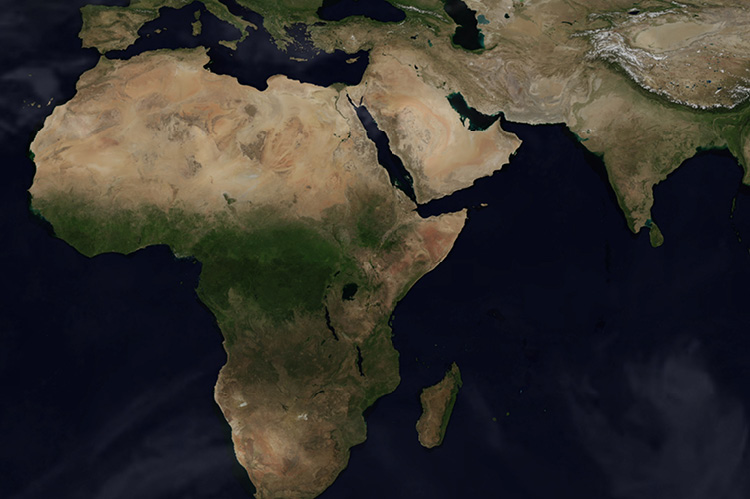
Russia’s oil ban in the US and several EU member states have opened a new chapter of Africa’s role in helping Europe become energy secure by becoming an alternative source of gas and oil.
Considering that Russia is the world’s third-largest oil producer, the country exports about five million barrels of crude oil daily, with Europe accounting for more than half of Russia’s total crude oil export before tougher sanctions were imposed following Russia’s invasion of Ukraine.
Before the sanctions hit, US and UK’s oil and gas imports from Russia accounted for approximately 3% and 8% of transcontinental exports. However, the International Energy Agency has reported a 700,000 barrels-per-day drop in Russia’s oil production, speculating that the decline could triple by the end of May to 3 million barrels per day.
Weaning off Russian Energy in Europe
Russian gas also accounts for about 40% of EU natural gas imports transported through a network of pipelines. Some gas pipelines pass through Ukraine, while others transit Belarus, Poland, and under the Baltic Sea.
Europe is the largest consumer of Russian gas worldwide. As such, securing alternative sources of oil and gas supplies from middle-East such as Israel and Qatar, and African countries such as Algeria and Nigeria would drastically reduce the block’s reliance on Russian energy. Currently, the EU imports about 8% of its total natural gas import from Algeria.
Germany, one of Russia’s natural gas consumers, suspended the $11 billion New Nord Stream 2 gas pipeline project due to the Ukraine crisis. The pipeline, which stretches 1,230 km (760 miles) under the Baltic Sea and links Germany to Western Siberia, was anticipated to double the capacity of Nord Stream 1. Germany can import natural gas from Norway, Denmark, the Netherlands, and Britain through a combination of LNG terminals and pipelines.
Africa’s Potential to Supply Oil and Gas to Europe
Although Europe has a wide range of options, Africa is among the feasible options for alternative oil and gas supply since nearly half of the continent’s 55 countries have enormous gas reserves, totaling about 800 trillion cubic feet. Nigeria takes the lead with 206.53 trillion cubic feet, followed by Algeria (159.1 trillion), Senegal (120 trillion), Mozambique (100 trillion), and Egypt (77.2 trillion).
Going by the amount in reserves, the continent has enough natural gas deposits and could support the US’ effort to help its European allies secure alternatives from Asia, the Middle East, and North America.
While speaking at the gas exporting countries’ forum in Doha, Nigerian Energy official, Timipre Sylva, confirmed Nigeria’s plans to construct a trans-Saharan pipeline to transport its natural gas to Europe through Algeria.
The comments were supported by signing a MoU between Algeria and Nigeria and the ongoing Trans-Saharan pipeline project. The pipeline will run from Northern Nigeria to Europe through Algeria and Niger.
Despite abundant natural gas deposits and ongoing pipeline projects, Africa still lacks the essential infrastructure to adequately fill the natural gas deficit, with a lack of investment in infrastructural development hampering the growth of Africa’s energy industry.
North Africa already exports natural gas to Europe through Algeria’s Maghreb-Europe gas pipeline that moves gas to Portugal and Spain through Morocco and the Medgaz pipeline that links directly to Spain.
Algeria is Africa’s largest gas exporter, the country exported approximately 17 billion cubic feet of gas to Spain in 2019 n alone, with the figure reducing by about 8 billion cubic feet in 2020 due to a strained relationship between Algeria and Morocco, with the former announcing to begin exporting its gas directly to Spain.
Despite having enormous oil and gas reserves, the infrastructure deficit in Sub-Saharan Africa is hampering natural gas production. For instance, Angola, an African country with 13.5 trillion cubic feet of the gas reserve, has experienced a steady decline in gas and oil production in the last five years due to a combination of operational and technical problems as well as a lack of incentives and infrastructural investment to spur large-scale energy exports. With the soaring demand for oil and gas in Europe, Africa could also play a significant role in Europe’s energy security.
Sources
https://indepthnews.net/index.php/opinion/5282-the-russian-oil-ban-opens-up-new-prospects-for-africa
